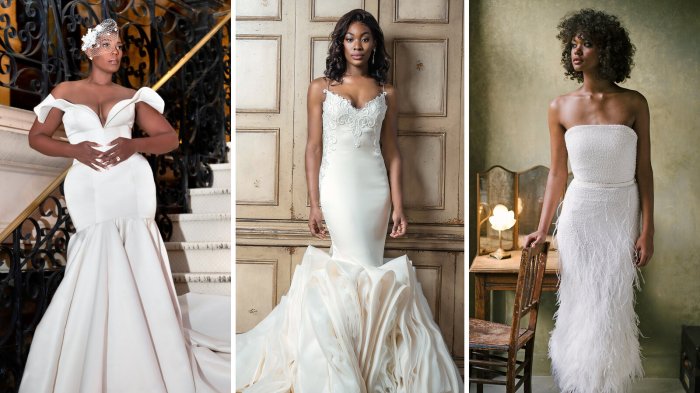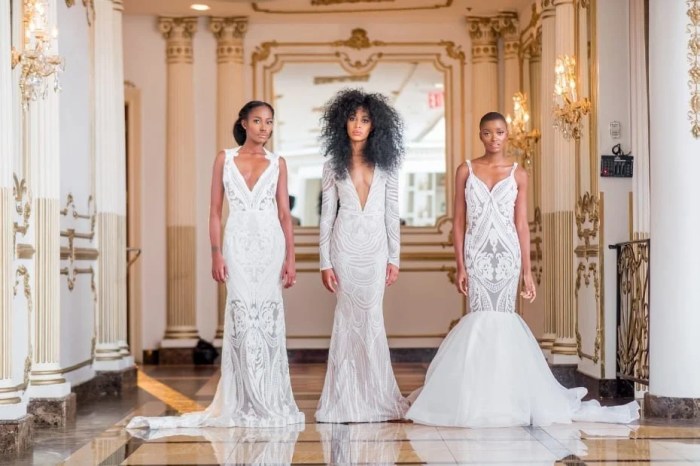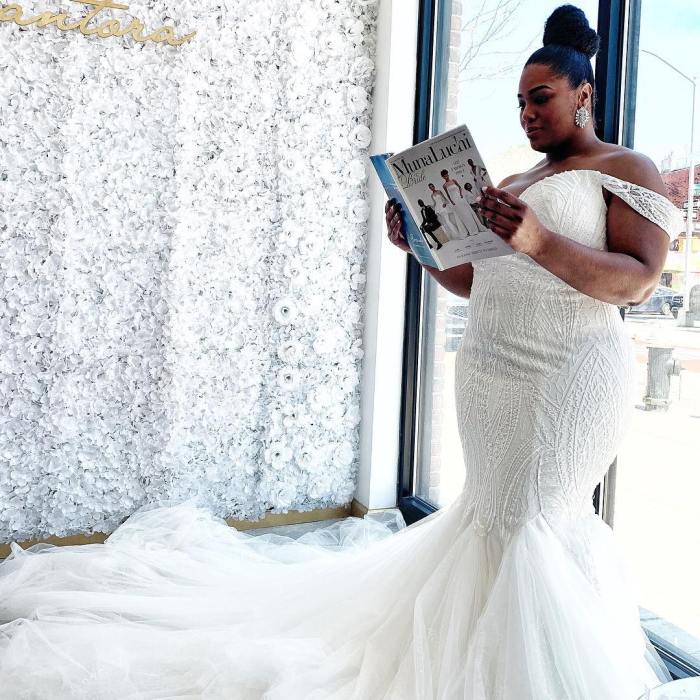A History of Black Wedding Dresses

Source: nyt.com
Black people wedding dresses – The history of Black wedding attire is a rich tapestry woven from diverse cultural threads, economic realities, and evolving social landscapes. From the impact of slavery and segregation to the rise of contemporary designers, the choices Black brides have made reflect resilience, creativity, and a powerful assertion of identity.
Historical Context of Black Wedding Attire
The evolution of Black wedding dress styles is intrinsically linked to the socio-political climate. During slavery, elaborate weddings were largely inaccessible, with attire reflecting the limitations imposed. Post-slavery, styles reflected a blend of available resources and aspirations for a more celebratory occasion. The Civil Rights Movement further influenced the expression of identity through clothing, leading to greater freedom in style choices.
Economic factors played a significant role. Access to fine fabrics and skilled seamstresses varied greatly, leading to diverse expressions of bridal style. While some brides could afford opulent gowns, others made do with simpler, yet equally meaningful, attire. This economic disparity continues to influence contemporary choices.
A timeline illustrating key moments and shifts would include:
- Pre-Civil War: Limited access to resources resulted in simple, practical dresses.
- Post-Reconstruction Era: A gradual shift towards more elaborate styles, reflecting growing economic opportunities for some.
- Early 20th Century: Influence of broader fashion trends, but often adapted to available resources and cultural preferences.
- Civil Rights Era and Beyond: Increasing self-expression through diverse styles and the incorporation of African and other cultural elements.
- Late 20th and Early 21st Century: A flourishing of Black designers and a broader acceptance of diverse bridal aesthetics.
Modern Trends in Black Wedding Dresses, Black people wedding dresses

Source: shoppeblack.us
The diversity of styles in black people wedding dresses is truly remarkable, showcasing a range of traditions and modern aesthetics. Finding the perfect gown often involves extensive searching, and luckily, if you’re in the Ohio area, you can explore numerous options, including those available at shops specializing in wedding dresses Toledo Ohio. This ensures a wide selection to complement the unique vision of any bride, whether they prefer classic elegance or a more contemporary design for their special day.
Current trends show a vibrant mix of styles, reflecting the diverse tastes and backgrounds of Black brides. Many embrace classic silhouettes, while others opt for more modern, unconventional designs. There’s a growing appreciation for incorporating cultural details and unique personal touches.
These styles often differ from broader trends by incorporating bolder colors, richer fabrics, and intricate embellishments that celebrate heritage and individuality. This creates a unique aesthetic within the broader bridal fashion landscape.
Several designers specialize in creating gowns that cater specifically to Black brides, offering designs that flatter diverse body types and celebrate cultural heritage.
| Designer | Design Style | Website |
|---|---|---|
| [Designer Name 1] | [e.g., Modern, Romantic, Traditional] | [Website Link] |
| [Designer Name 2] | [e.g., Boho, Chic, Avant-Garde] | [Website Link] |
| [Designer Name 3] | [e.g., Classic, Contemporary, Cultural Fusion] | [Website Link] |
| [Designer Name 4] | [e.g., Minimalist, Luxury, Plus-Size Specialist] | [Website Link] |
Contemporary Black wedding dresses often feature vibrant colors, luxurious fabrics like silk and lace, and intricate embellishments such as beading, embroidery, and appliqué. Ankara fabric, a vibrant printed cotton, is increasingly popular, adding a distinct cultural element.
Cultural Significance of Fabrics and Styles

Source: essence.com
The choice of fabric and style holds significant symbolic meaning. Lace often represents elegance and tradition, while silk signifies luxury and sophistication. Ankara fabric, originating from West Africa, represents a strong connection to heritage and cultural pride. The incorporation of traditional African patterns and designs adds a layer of cultural richness and personal significance.
Family heritage and cultural identity strongly influence dress selection. Brides often choose styles that reflect their family’s history, regional traditions, or personal connection to their cultural background.
Examples of cultural influences across the Black diaspora include:
- Incorporating traditional West African patterns and colors in gowns.
- Using Caribbean-inspired lace and embellishments.
- Incorporating elements of Southern American traditions.
- Blending various cultural influences to create unique, personalized styles.
Design Elements and Aesthetics
Common design features include a variety of necklines (e.g., sweetheart, halter, off-the-shoulder), sleeve lengths (e.g., sleeveless, long sleeves, three-quarter sleeves), and train lengths (e.g., chapel train, cathedral train, no train). The choice depends on personal preference, body type, and the formality of the wedding.
Body type and personal style significantly impact dress selection. A bride’s individual preferences, along with her body shape, influence the silhouette, neckline, and overall aesthetic of her chosen gown.
Sketch 1: A mermaid gown in ivory silk, featuring delicate lace appliqués along the bodice and train. The neckline is a sweetheart neckline, and the sleeves are long and flowing. The embellishments include hand-sewn pearls along the lace.
Sketch 2: A ballgown in vibrant Ankara fabric, showcasing a bold, colorful pattern. The neckline is a high neckline with intricate beading, and the sleeves are off-the-shoulder. The skirt is full and voluminous.
Sketch 3: A simple A-line gown in champagne-colored satin, featuring a minimalist design. The neckline is a V-neck, and the sleeves are sleeveless. The dress is unadorned, emphasizing the elegance of the simple silhouette.
Different dress styles cater to various levels of formality and venue appropriateness. A simple A-line gown might be suitable for a beach wedding, while a more elaborate ballgown might be more appropriate for a formal ballroom setting.
Representation and Inclusivity in the Wedding Industry
Representation and diversity within the wedding industry are crucial for ensuring that all brides feel seen, valued, and celebrated. Black brides deserve to see themselves reflected in bridal fashion and to have access to a diverse range of vendors who understand and cater to their unique needs and preferences.
Challenges include a lack of representation in mainstream bridal media and a limited selection of gowns that cater to diverse body types and skin tones. Opportunities lie in supporting Black-owned businesses and designers and advocating for greater inclusivity within the industry.
Initiatives promoting inclusivity include showcasing diverse models in bridal campaigns, featuring designers who specialize in gowns for Black brides, and providing resources to help brides find vendors who are committed to inclusivity.
Social media and online platforms play a vital role in showcasing diverse wedding styles, allowing brides to find inspiration and connect with vendors who understand their needs. These platforms facilitate a more inclusive and representative portrayal of bridal fashion.
Popular Questions: Black People Wedding Dresses
What are some budget-friendly options for Black brides?
Consider renting a dress, opting for less expensive fabrics, or choosing a simpler design with fewer embellishments. Shopping at sample sales or consignment stores can also yield significant savings.
How can I find a designer who understands my specific cultural needs?
Research designers online, look for portfolios showcasing diverse brides, and read reviews. Attending bridal shows and connecting with wedding planners specializing in culturally diverse weddings can also be beneficial.
Where can I find Black-owned bridal boutiques?
Utilize online directories and social media to find Black-owned bridal boutiques in your area or nationwide. Many online communities and platforms highlight and support Black-owned businesses.
